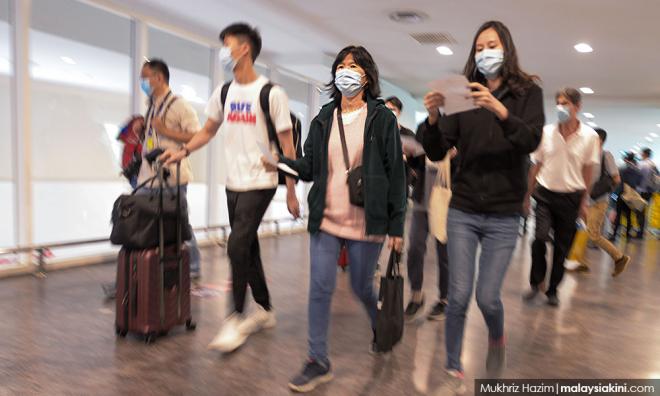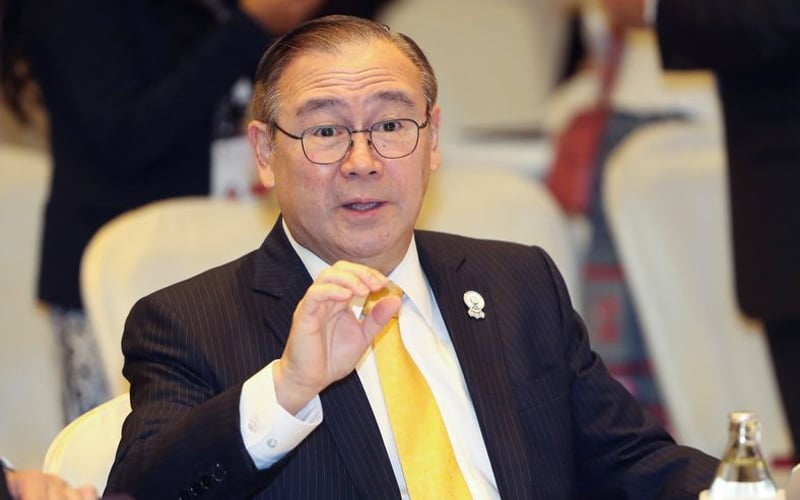
Published by Malaysiakini & Business Today, image from Malaysiakini.
Opening the country’s border for international tourists even from the ‘green nations’ should be reconsidered – or at least until the long-awaited Covid-19 vaccine arrives in the market; because this is the starting point that could lead to the second wave of the pandemic.
Although allowing international tourists to enter our country is a much-needed strategy to ramp up our economic growth, the national priority should remain “health first”.
Instead, there is another alternative that should be focused on to speed up the economic recovery, which is by propping up our domestic tourism.
While many other countries like Spain, Jamaica and Turkey have started welcoming the international tourists again, let us not be deceived by their moves, but instead, we should have to take a more cautious approach when it comes to reopening the border – what’s more when imported Covid-19 cases are seen fluctuating day by day.
In the same token, Health Ministry director-general Dr Noor Hisham said: “We need to be vigilant. The recommendation should not be to ease the border, but to tighten it.”
Although some might think that we should not get too distracted by the threats of the pandemic, well, think again.
Reopening international borders is not as easy and less-risky as reopening the mall for instance as it requires meticulous planning from many parties, in which, if the steps taken are erroneous, could jeopardize the safety of our country as well as the health of nations.
However, it is critical to note that by doing this, not that we are acting ‘not-proactive’, but instead, we are actually protecting the nation from all uncertainty of the pandemic.
Ask yourself – do you want our country to return to the day when the movement control order (MCO) took place, whereby all the unimportant economic sectors had to be stopped from operating?
Well, just to recap, due to implementing the MCO, Malaysia is facing the worst quarterly economic contraction in more than two decades, which is at 17.1 percent in its second quarter of 2020.
However, Malaysia seems to have gone through the worst moment and is now gradually reviving its economy – as lockdown measures have eased under the recovery MCO.
It seems that we have just been able to breathe again from the economic catastrophe caused by the pandemic, given that almost all business sectors are recovering, albeit slowly.
Thus, while the opportunity to gradually recover from the pandemic is still there, it is crucial for us to use it wisely and not being hasty – by chasing after the ‘so-called economic stability’ which still remains ambiguous.
Globally, if we take a look at the foreign countries like Canada, they have sternly decided to continue to keep its doors firmly shut to most foreigners, despite the pleas that they received from affected groups — such as the travel industry.
In return, many Canadians applaud their government for its strict travel restrictions, implemented to help stop the spread of Covid-19 in the country.
As a matter of fact, why don’t we just focus on bolstering our domestic tourism first, instead of easing our international border?
Positively, the easing of MCO in May and June has provided some relief to businesses in the domestic tourism sector, as hotels in certain tourist destinations had seen a spike in occupancy rates.
Besides, Malaysian Tourist Guides Council president Jimmy Leong told The Star that the domestic tourism sector was moving faster than expected, where high occupancy was observed over the past few weekends at selected destinations such as Melaka, Penang, Port Dickson, Kelantan and Pulau Redang.
It looks like the government’s initiative to reinforce domestic tourism is bearing fruit – although it may not be as big as before, the improvement is there. Indeed, more strategic planning and action need to be taken to continue ramping up this industry.
For instance, businesses and influencers should leverage social media platforms to promote our domestic tourism industry, since social media plays a significant role in our lives, and also because it’s easy to draw attention by stimulating the eyes of the people through appealing visuals.
Correspondingly, this is in line with the Deputy Tourism, Arts and Culture Minister Jeffrey Kitingan, as he said: “The tourism industry, whether leisure or business, is dependent on social media, given the nature of picturesque images as a way to introduce a destination to the world.”
Next, the government could also inject another round of financial assistance into this industry which can be used to run advertisements on Malaysian tourism, be it in the form of social media, print or billboard ads.
Through these ads, it would encourage people to buy, dine and travel to nearby shops and attractions.
This financial assistance could also be used to demonstrate how travellers can safely enjoy activities and attractions, a campaign with safety messaging with people wearing masks, practising physical distancing and sanitization.
Besides, have you heard about culinary tourism?
In brief, it is also known as food tourism, where tourists visit novel or known places and explore its culture through food and dishes prepared in that region. Through this initiative, it may involve a wide variety of activities such as cooking classes, food festivals, and others.
Apart from being an important role in promoting destination marketing, it is crucial for hotels and tour agencies to expand their culinary tourism choices in order to meet their customers’ demands and provide quality food tourism experiences.
Given that tourists usually spend over a third of their holiday budget on food and drink, and even up to 50 percent when food is the primary travel purpose, bolstering this industry via this strategy wouldn’t hurt.
Nurafifah Mohammad Suhaimi is Research Assistant at EMIR Research, an independent think tank focused on strategic policy recommendations based on rigorous research.
Diterbitkan oleh Malaysiakini & The Malaysian Insight.
Membuka sempadan negara untuk pelancong antarabangsa walaupun dari ‘negara hijau’ harus dipertimbangkan – atau sekurang-kurangnya sehingga vaksin yang ditunggu-tunggu tiba di pasaran.
Jika tidak berhati-hari, ini boleh menjadi titik permulaan yang membawa kepada gelombang kedua pandemik.
Walaupun pembukaan sempadan negara perlu bagi meningkatkan pertumbuhan ekonomi, kesihatan dan keselamatan rakyat haruslah diutamakan.
Pada masa yang sama, kata Dr Noor Hisham Abdullah, “Kita harus waspada. Pengesyoran tidak boleh untuk meringankan sempadan, tetapi untuk mengetatkan.”
Walaupun ada yang berpendapat bahawa kita tidak boleh terlalu terganggu dengan ancaman wabak tersebut, fikirkanlah semula.
Membuka semula sempadan antarabangsa tidak semudah dan kurang berisiko seperti membuka semula pusat membeli-belah misalnya, tetapi memerlukan perancangan teliti dari banyak pihak.
Jika langkah-langkah yang diambil salah, dapat membahayakan keselamatan negara serta kesihatan rakyat.
Namun, penting untuk kita tahu bahawa kita bukanlah bertindak ‘tidak proaktif’, tetapi, kita sebenarnya sedang melindungi negara dari segala kemungkinan yang boleh berlaku akibat daripada wabak tersebut.
Tanya diri anda – adakah anda mahu negara kita kembali ke hari ketika Perintah Kawalan Pergerakan (PKP) berlaku, di mana semua sektor ekonomi yang tidak penting harus dihentikan daripada beroperasi?
Sekadar untuk mengingatkan- akibat daripada pelaksanaan PKP, ekonomi Malaysia menguncup 17.1 peratus pada suku kedua tahun ini, kadar terendah sejak suku keempat 1998 iaitu -11.2 peratus.
Namun, kita sepertinya sudah dapat kembali bernafas daripada bencana ekonomi yang telah menimpa kita, memandangkan hampir semua sektor perniagaan telah pulih, walaupun dengan kadar perlahan.
Oleh itu, sementara peluang untuk pulih secara beransur-ansur daripada wabak masih ada, sangat penting bagi kita untuk menggunakannya dengan bijak dan tidak terburu-buru – dengan terus mengejar “kestabilan ekonomi’ yang dilihat masih samar-samar.
Pelancongan kulinari
Malah, bukankah lagi bagus jika kita hanya fokus untuk memperkasa sektor pelancongan domestik terlebih dahulu, sebagai alternatif lain yang lebih selamat untuk memacu ekonomi negara?
Sebagai contoh, sektor perniagaan di dalam industri ini serta “influencers” harus memanfaatkan platform media sosial untuk mempromosi industri pelancongan domestik, kerana media sosial memainkan peranan penting dalam kehidupan seharian kita.
Dengan visual-visual menarik yang dimuat naik di media sosial, ia mampu menarik perhatian ramai dan secara tidak langsung mempengaruhi mereka untuk melancong di dalam negara kita.
Seterusnya, kerajaan boleh menyuntik satu lagi bentuk bantuan kewangan ke dalam industri ini yang dapat digunakan untuk mengiklankan tempat-tempat menarik di Malaysia, baik dalam bentuk iklan media sosial, iklan cetak atau papan iklan.
Melalui iklan tersebut, pelancong juga dapat diuar-uarkan dengan cara yang selamat dan berkesan untuk menikmati percutian mereka tanpa membahayakan kesihatan dan keselamatan mereka.
Selain itu, pernahkah anda dengar mengenai pelancongan kulinari?
Secara ringkas, ia juga dikenali sebagai pelancongan makanan, di mana pelancong mengunjungi tempat-tempat baharu atau terkenal dan meneroka budayanya melalui makanan dan hidangan yang disediakan di wilayah tersebut.
Inisiatif ini selalunya melibatkan pelbagai aktiviti seperti kelas memasak, festival makanan, dan lain-lain.
Selain berperanan penting dalam mempromosikan pemasaran destinasi, sangat penting bagi hotel dan agensi pelancongan untuk memperluas pilihan pelancongan kulinari mereka bagi memenuhi permintaan pelanggan serta memberikan pengalaman pelancongan makanan yang berkualiti.
Memandangkan pelancong biasanya menghabiskan lebih dari satu pertiga bajet mereka untuk makanan dan minuman, dan bahkan hingga 50% jika makanan adalah tujuan utama percutian, memperkasa industri melalui strategi seperti ini tidak akan merugikan.
Nurafifah Mohammad Suhaimi merupakan Pembantu Penyelidik di EMIR Research, sebuah organisasi pemikir bebas yang berfokuskan kepada pencernaan saranan-saranan dasar strategik berteraskan penyelidikan yang terperinci, konsisten dan menyeluruh.

